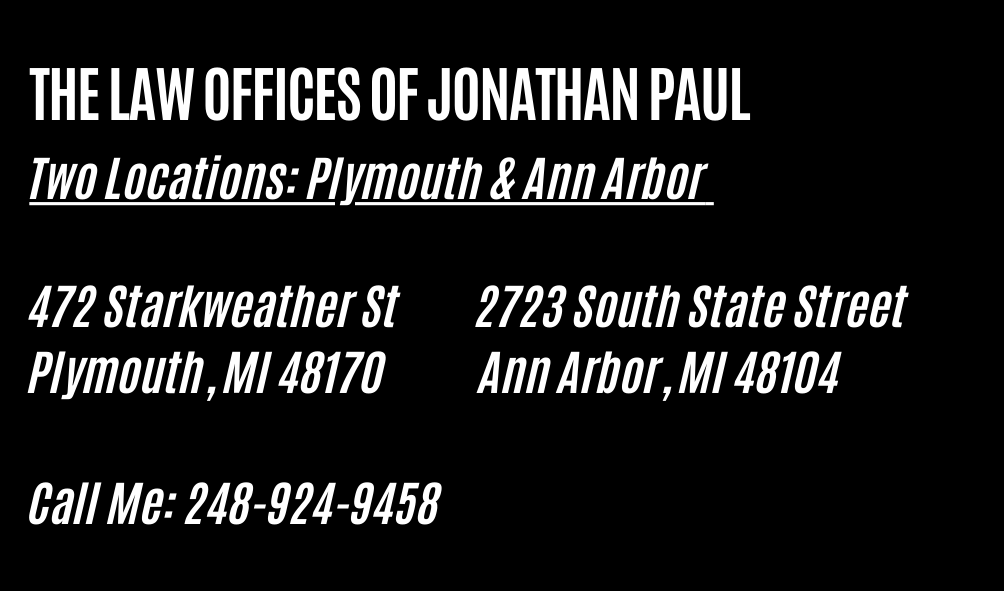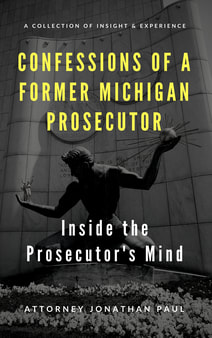If you've been charged with a Michigan Embezzlement for the very first time, this doesn't make you a criminal or a bad person. I see clients on a daily basis who have have never been arrested or even accused or doing something wrong. It's quite common that a good person will get themselves in a bad situation, which results in being charged with a Michigan Embezzlement.
Michigan embezzlement is a serious crime with implications that could affect your ability to gain future employment. The crime of embezzlement involves you as an agent or servant or in a position of trust by a principal actor.
In order to be found guilty of this offense, the prosecution must prove:
- There was money or property stolen, which belonged to the principal
- You had a relationship of trust with the principal as an agent or employee
- You obtained possession or control of the money or property because of that relationship
- You dishonestly disposed of or converted the money or property to your own use or secreted the money with intent to convert it to your own use without consent of the principal
- At the time of the conversion, you intended to defraud or cheat the principal
The penalty for Michigan embezzlement varies depending upon the value of the money or property. The value is based on “fair market value” and it ranges from $1000-$20,000, $200-$1000 and some amount under $200. Embezzlement over $1,000 is a felony in the State of Michigan.
The crime of embezzlement in Michigan is different than larceny, and other property crimes, because of the “trust” relationship, meaning you legally possessed the money or property, but violated that trust by going beyond the trust granted.
It’s common for an employee of a company to be charged with this offense, because that employee was in possession of the company’s money or property as an employee, but did something to go outside of this trust.
A common case is the employee working the cash register and manipulating the transactions or outright stealing money from the cash register for their own financial gain. It may be possible for your attorney to work on a plea agreement with the prosecution that may have you pay the money back to the employer and agree to never return again in exchange for a plea to a lesser offense.
Some key points about this offense:
Fair market value is measured by what the property would have sold for on an open market at the time of the offense. For money, the value is a lot more clear.
If the facts support that you have committed this offense on different occasions, the prosecution can aggregate the amounts. which could lead to a more serious degree of this crime.
Intending to return the property or pay back the money at a future date is not a defense to the crime. It is also possible to be charged with embezzlement and false pretenses on the same facts, which would not violate Double Jeopardy.
Michigan embezzlement is a serious crime with implications that could affect your ability to gain future employment. The crime of embezzlement involves you as an agent or servant or in a position of trust by a principal actor.
In order to be found guilty of this offense, the prosecution must prove:
- There was money or property stolen, which belonged to the principal
- You had a relationship of trust with the principal as an agent or employee
- You obtained possession or control of the money or property because of that relationship
- You dishonestly disposed of or converted the money or property to your own use or secreted the money with intent to convert it to your own use without consent of the principal
- At the time of the conversion, you intended to defraud or cheat the principal
The penalty for Michigan embezzlement varies depending upon the value of the money or property. The value is based on “fair market value” and it ranges from $1000-$20,000, $200-$1000 and some amount under $200. Embezzlement over $1,000 is a felony in the State of Michigan.
The crime of embezzlement in Michigan is different than larceny, and other property crimes, because of the “trust” relationship, meaning you legally possessed the money or property, but violated that trust by going beyond the trust granted.
It’s common for an employee of a company to be charged with this offense, because that employee was in possession of the company’s money or property as an employee, but did something to go outside of this trust.
A common case is the employee working the cash register and manipulating the transactions or outright stealing money from the cash register for their own financial gain. It may be possible for your attorney to work on a plea agreement with the prosecution that may have you pay the money back to the employer and agree to never return again in exchange for a plea to a lesser offense.
Some key points about this offense:
Fair market value is measured by what the property would have sold for on an open market at the time of the offense. For money, the value is a lot more clear.
If the facts support that you have committed this offense on different occasions, the prosecution can aggregate the amounts. which could lead to a more serious degree of this crime.
Intending to return the property or pay back the money at a future date is not a defense to the crime. It is also possible to be charged with embezzlement and false pretenses on the same facts, which would not violate Double Jeopardy.



